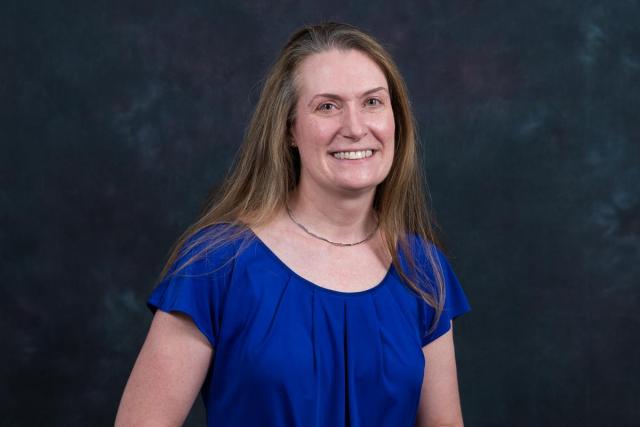Q&A: Faculty Researcher – Laura Lorentzen, Ph.D.

Laura Mackey Lorentzen, Ph.D., is an associate professor and chair of the Department of Biological Sciences in The Dorothy and George Hennings College of Science, Mathematics and Technology. Her research focuses on STEM education, including ways to encourage students to enter the fields of science or mathematics. She is principal investigator on an NSF-funded Robert Noyce Teacher Scholarship Program grant.
What is your research area?
In recent years, my major research area has been STEM education, specifically engaging students to pursue science or math as their field of study. Earlier this year, with my research collaborators – Dr. Louis Beaugris (math), and Lecturer Pat McDermitt and Dr. Gail Verdi (both in the College of Education) – I was named principal investigator (PI) on a Robert Noyce Teacher Scholarship Program award of well over $1 million. This is National Science Foundation (NSF) grant-funded research that is now underway and will continue for at least the next five years. The aim is to support STEM undergraduates in their journey to be experienced teacher leaders in high-needs high schools and to support research on the effectiveness and retention of such educators.
In one sentence, what is the most important question you want to address?
How can we increase the diversity of secondary education STEM teachers and also retain them in their professions?
What has been the impact of your research?
Our research is in its infancy. We are in the early months of year one of a five-plus year grant. However, a 2022 Task Force Report by the American Federation of Teachers suggests a way to address the national teacher shortage problem is to increase the diversity in the teacher workforce through sustained mentoring. Such is the premise for the major objective of our NSF Noyce Grant, titled CREST, which stands for Culturally Responsive Education of STEM Teachers.
Kean sophomores are invited to apply by February 14 – Valentine’s Day – each year over the next few years, starting in 2024. Students selected as a Kean CREST Noyce Scholar would receive support in their junior and senior years of college as they complete their bachelor’s degrees in either biology education, chemistry education, earth science education or mathematical sciences education. Noyce Scholars not only receive a significant tuition scholarship but are supported by a PLC, a professional learning community, of Kean faculty, fellow Noyce Scholars and lead teachers at our high school partners for this grant. They will complete their undergraduate curriculum while having opportunities to convert the theory behind culturally responsive pedagogy into practice, using asset-based research, including designing units of study that will provide active learning and student engagement for their classroom demographics.
Kean University is eager to serve the urban community. Does your research have any potential in this area?
Our grant-funded research specifically involves two urban high-needs school districts in New Jersey, Lakewood and Union. Through this grant, we are expanding the Tomorrow Teacher’s Program, whereby high school students interested in becoming teachers themselves can take a high school course to explore the teaching profession. Those credits can be applied at Kean should they pursue their education here. Our grant will afford up to 28 Noyce Scholars over the grant award period; these scholars will do their classroom observations and student teachings in the Lakewood and Union schools. Furthermore, Noyce Scholars each commit to teaching high school science or mathematics for four years in a New Jersey high-needs school district when they graduate.
We are eager to develop collaborations among departments. What opportunities for multi-disciplinary work does your research offer?
Our Noyce Scholarship Program is a NSF-funded grant research opportunity that is truly intercollegiate, wherein it affords the concerted efforts of the mathematics, biology, chemistry and earth science departments. It also affords a direct collaboration between the College of Education and The Hennings College of Science, Mathematics and Technology in order to successfully advance the grant’s objectives to recruit and prepare as well as diversify and retain the science and math teacher workforce in high-need school districts in our state.
What advice would you give to a new researcher about working with students on research?
Kean’s undergraduate students are interested and motivated. The students may be unaware, however, of the expectations that come with signing on for independent research experiences or grant-funded research. The faculty researcher should enter such endeavors with the understanding they must mentor, guide and instruct – perhaps even more so than they otherwise might have assumed. While research productivity is always the end goal, the faculty are first there to develop the students’ skill set and mindset on how to approach the research before the productivity of robust research can be realized.